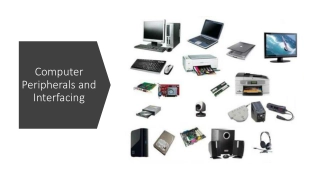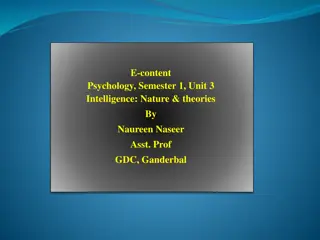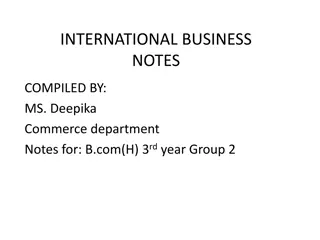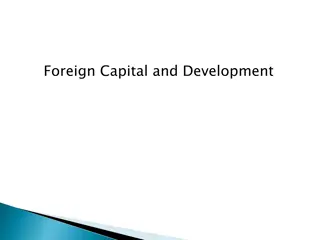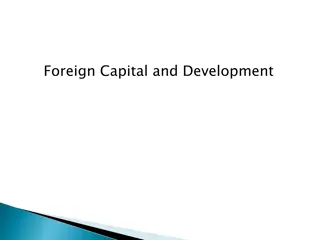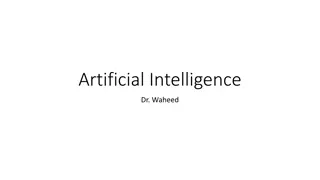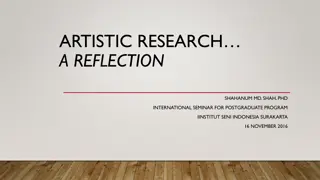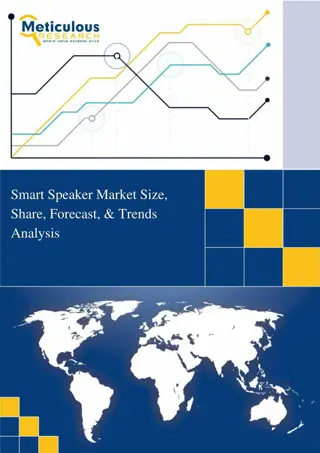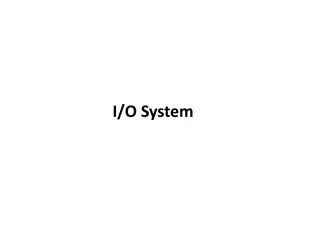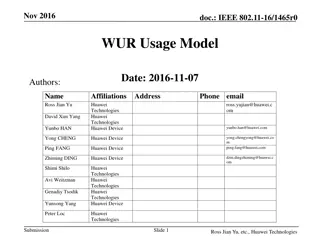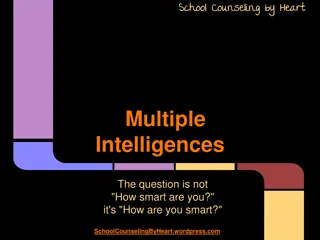Exploring AI Trends in Foreign Intelligence, Artistic Creation, Communication, and Smart Devices
AI is transforming various sectors such as foreign intelligence analysis, artistic creation, task assistance, and smart devices. Advancements in AI technology offer benefits like faster analysis in intelligence, automated artistic processes, improved communication through AI technology, and seamless experiences with AI-powered smart devices. However, challenges such as potential biases in AI algorithms and privacy concerns need to be addressed. The democratization of AI is making it more adaptable and accessible, empowering individuals and organizations in different industries.
Download Presentation

Please find below an Image/Link to download the presentation.
The content on the website is provided AS IS for your information and personal use only. It may not be sold, licensed, or shared on other websites without obtaining consent from the author. Download presentation by click this link. If you encounter any issues during the download, it is possible that the publisher has removed the file from their server.
E N D
Presentation Transcript
The Future of Artificial Intelligence Exploring the Top AI Trends Photo by Pexels
Evolution of Foreign Intelligence Advantages of AI in Foreign Intelligence Challenges of AI in Foreign Intelligence Advancements in AI technology enable faster and more accurate analysis of foreign intelligence. Increased reliance on AI may lead to potential vulnerabilities and risks in terms of cybersecurity. AI can process and analyze vast amounts of data, providing valuable insights in real-time. AI algorithms can be biased and may reinforce existing biases in foreign intelligence analysis. Automated AI systems can enhance the efficiency of foreign intelligence operations, freeing up human resources. The deployment of AI in foreign intelligence can raise ethical concerns regarding privacy and civil liberties.
AI's Impact on Art Forms AI is revolutionizing art creation by enabling the generation of various forms like painting, music, videos, and images. Discover how AI is transforming the creative industries by automating artistic processes and pushing the boundaries of imagination. Explore the intersection of technology and art as AI algorithms produce stunning visuals and breathtaking breathtaking compositions. Witness the fusion of human creativity and machine intelligence, resulting in mesmerizing and awe-inspiring artistic outputs.
AI Technology for Tasks and Communication Benefits of AI Technology Challenges with AI Technology AI technology like Chat GPT can provide assistance in a wide range of tasks. There is a potential loss of jobs due to automation. It improves communication by generating human-like responses. AI can sometimes produce biased or inaccurate outputs. It can handle complex queries and provide accurate information efficiently. Privacy concerns arise as personal data is processed by AI systems.
AI-powered Smart Devices Seamless Experiences Enhancing daily lives with AI technology Smart Devices Enabling seamless user experiences AI Augmented Working Industry Transformation Transforming industries with AI integration Taking over menial tasks Enhanced Living Innovation Opportunities Improving efficiency and productivity Creating new possibilities for innovation
Democratization of AI Adaptable and Efficient AI is becoming more adaptable and efficient, allowing for widespread integration into everyday life. The advancements in AI technology have made it easier for individuals and organizations to access and utilize AI capabilities. AI is now being used in a variety of industries, such as healthcare, finance, and transportation, to improve productivity and decision- making. The democratization of AI empowers individuals to leverage its power for personal and professional growth. Photo by Pexels
Bridging Real and Digital AI-based applications leveraging machine learning to create a Digital Universe Complementing the real world through advanced technology Exploring the potential of AI in bridging the gap between physical and digital realms
Progress in Autonomous Systems Autonomous Vehicles Advancements Industry Robots AI Role Crucial Plays
The Future of AI Positive Implications Negative Implications AI has the potential to revolutionize industries, increasing productivity and efficiency. AI may lead to job displacement, requiring retraining and adaptation for the workforce. AI can improve healthcare outcomes, leading to better diagnoses and personalized treatments. AI can raise ethical concerns, such as privacy violations and biases in decision-making algorithms. AI can help address global challenges, such as climate change and poverty, through data analysis and prediction. AI advancements may exacerbate existing social inequalities and create new ones.
AI Challenges The ethical implications of AI development Addressing biases and discrimination in AI algorithms AI's role in social manipulation and fake news The impact of AI on job displacement Ensuring privacy and data security in AI systems The need for transparent and explainable AI systems
The Transformative Power of AI Benefits of AI Challenges of AI AI has the potential to revolutionize industries and improve efficiency. There are concerns about the ethical implications of AI, such as privacy and bias. Machine learning algorithms can analyze vast amounts of data and make accurate predictions. AI can replace jobs and disrupt the workforce, leading to unemployment. AI can automate repetitive tasks, freeing up human resources for more complex and creative work. The reliance on AI may decrease human decision-making capabilities and critical thinking skills.



